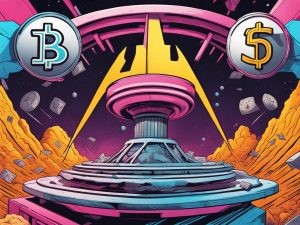Is Decentralization Still Safe in the Crypto World?
Hey there! I’m excited to share some insights about a recent legal ruling that’s shaking things up in the crypto and DeFi space. It’s a big deal, and as someone who’s been deep into the crypto market analysis, this ruling hits home—especially for those who are considering investing. Let’s break it down together.
Key Takeaways:
- U.S. federal judge rules DAO members liable under California partnership laws.
- The case against Lido DAO highlights potential risks for DeFi participants.
- Increased liabilities could stifle decentralized governance and innovation.
- Notable venture firms involved could face repercussions from the ruling.
Now, let’s dive into the juicy details. A U.S. federal judge, Vince Chhabria, recently declared that participants in decentralized autonomous organizations (DAOs) can be held responsible for actions taken by fellow members in California. This is a game changer for the DeFi sector. The ruling came from a lawsuit filed by Andrew Samuels, who accused Lido DAO of not registering its tokens as securities. This can raise some serious red flags for investors—like, “Should I still put my money into these decentralized setups?”
Understanding the Legal Twist
The court found that Lido DAO operates as a general partnership, which is why members can be held accountable for one another’s decisions. Just think about it: if you’re involved in a DAO and someone makes a questionable move, you could potentially be on the hook for that. That’s nerve-wracking, right? Samuels pointed fingers at major players like Paradigm Operations and Andreessen Horowitz, naming them as inactive partners in this whole operation. Considering their reputations, this adds another layer of complexity to how we view investments in DAOs.
Here’s where it gets even more interesting: the judge let most of the claims proceed against those big firms while dismissing only Robot Ventures for lack of evidence. Imagine being part of a project that’s intended to be decentralized, but suddenly, you’re caught in a legal web that you didn’t even see coming. It’s like going to a party and finding out there’s a surprise dance-off competition—but now, if you don’t dance well, you might just take a hit on your bank account!
The Impact on the Crypto Community
The ruling has sparked a heated debate among legal experts and crypto enthusiasts alike. People are concerned this could lead to “increased liability” and might stifle the very essence of what decentralized governance stands for. This is crucial because many of us, myself included, embraced crypto precisely for its autonomy and less centralized control. Now, we might have to rethink how we engage with these spaces.
Miles Jennings, a prominent figure in the crypto legal landscape, shared his apprehensions. He argued that merely participating—like posting in a forum—could put members at risk of legal action. Just think of the implications: what if a little comment from you about a new project spirals into a legal nightmare? Talk about having “FOMO” in the wrong ways!
What This Means for Would-Be Investors
For those thinking about diving into crypto investments or getting involved in DAOs, here are a few practical tips I’d recommend:
- Do Your Research: Understand the governance structure of the DAOs you’re looking at. What protections or liabilities do they present? Understanding the risks here is crucial.
- Stay Informed: Keep up with the latest developments in crypto law. This space is evolving faster than we can keep track of and being ahead can save you headaches down the line.
- Engage Cautiously: If you decide to interact with DAOs, consider limiting your public engagement to protect yourself from liabilities. A little caution can go a long way here.
- Legal Advice: If you are serious about investing large amounts, consulting with a legal expert familiar with crypto regulations could save you from potential pitfalls.
My Personal Take
I have to say, as a young investor in the crypto realm, this news really jolted me. Despite all the excitement around decentralization and innovation, seeing legal implications like this makes me pause. It’s the wild west out there! It makes us wonder—are we truly safe in the decentralized playground we’ve all grown to love? The push for regulation is often seen as necessary, but does it come at the cost of our freedom to innovate?
This ruling is undoubtedly a wake-up call for all of us in the community. It represents the first step towards a more regulated environment, sure, but it also raises valid concerns about the core principles of decentralization. How do we balance safety and innovation in a world that’s moving so fast?
As you reflect on this topic, I’d love to leave you with this thought: How far are you willing to go in the name of decentralization, and at what cost?





 By
By
 By
By
 By
By
 By
By
 By
By
 By
By